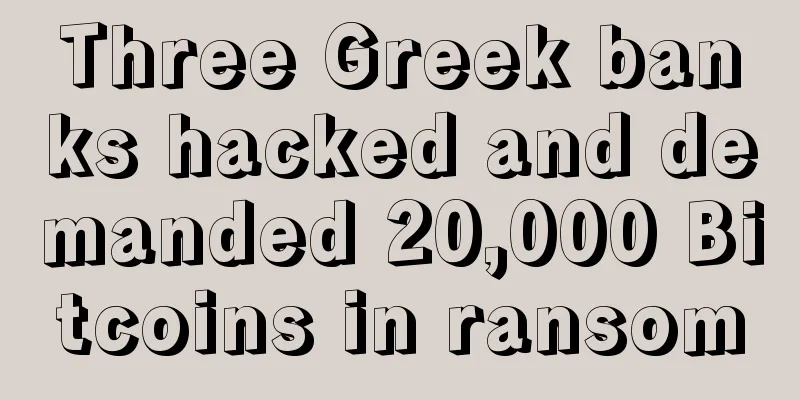Three Greek banks hacked and demanded 20,000 Bitcoins in ransom

|
Hackers yesterday launched a third cyberattack on three Greek banks, demanding 20,000 bitcoins (worth 7 million euros) as ransom from each of them, according to Greek police and the country's central bank. A hacker group calling itself the Armada Collective launched its first cyber attack on banks last Thursday, demanding a ransom and threatening to launch a full-scale cyber attack on the banks if they refuse to pay. The hackers initially used a form of distributed denial-of-service attack, forcing the buffers on bank servers to fill up and eventually collapse under the pressure. On Thursday, the hackers temporarily succeeded in disrupting electronic transactions at three banks, but customer information was protected, according to a police official. The official said on Monday:
A central bank official added that cyber experts from the Bank of Greece and the police's e-crime unit were monitoring the bank's computer systems. Internet finance in Greece has grown rapidly since the government introduced capital controls in June, which have stifled banks, threatened the financial system and forced Greece out of the eurozone. Since then, more than 200,000 new Internet accounts have been registered to facilitate domestic transactions. A senior Greek banker said:
Paul Vlissidis, technical director of cybersecurity group NCC, said the "Invincible Armada" hacker group had carried out a number of attacks on banks in recent months, attempting to extort money from banks that were vulnerable to attack. Paul Vlissidis continued: This hacker group said, 'Give us Bitcoin, or we'll completely destroy you.' They claim to be able to cause huge damage to banks, but in fact they are taking advantage of the psychology of some banks spending money to solve problems. " However, Mr Vlissidis said there was no evidence yet that the latest attack came from the Armada hacker group, but it was possible that it imitated the "similar modus operandi" of the hacker group. According to the Bank of Greece, the latest hackers demanded 20,000 bitcoins each from three Greek banks as a ransom. Some email providers said their services had also been attacked by the hacker group calling itself the "Invincible Armada," and in September the Swiss government warned that the group was extorting local email providers. Original text: http://www.ft.com/intl/cms/s/0/13f9f65c-978a-11e5-95c7-d47aa298f769.html#axzz3t2Rr0vXR |
<<: Scotcoin is now accepted in a century-old pub in Scotland
>>: RMB-denominated Bitcoin grows in importance
Recommend
What kind of facial features are there to help you get married?
If a woman has a face that will bring bad luck to...
Messari founder: DeFi bubble is about to burst, and there are not enough victims
Ryan Selkis, founder of crypto data site Messari,...
Characteristics of strong women's faces Analysis of strong women's faces
Strong women are more opinionated, know how to thi...
Talk about the seven aspects of physiognomy
Physiognomy is the science of measuring and judgi...
Peter Todd: Bitcoin Lightning Network May Fail
The Lightning Network is considered by many in th...
Tierion Secures $1 Million in Seed Round Funding, Led by Blockchain Capital and Fenbushi Capital
Blockchain startup Tierion has raised $1 million ...
Women with good fortune are born with a strong ability to make money
Financial luck has always been a matter of great ...
Central banks find it hard to ignore blockchain technology, which has great potential for development
Central banks are increasingly showing interest i...
A man with a sunken forehead is not very gentle.
Often a person's face reveals a huge amount o...
What about women with crescent eyebrows? They are sensitive but easily emotional!
Do women with crescent eyebrows have good persona...
What kind of nose helps to make money?
What kind of nose helps to make money? Everyone h...
The other side of hydropower Bitcoin miners: What have they brought to the impoverished mountainous areas in the southwest?
Original title: "The contribution of a small...
Culture Wars: Preserving Digital Content on the Blockchain
Freedom of the press, freedom of expression and p...
The story behind the crypto market bull run
Original title: "As global central banks con...
What does it mean when a woman has thick eyebrows? She is loyal and devoted to relationships!
What does it mean when a woman has thick eyebrows...









